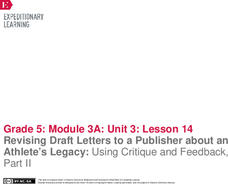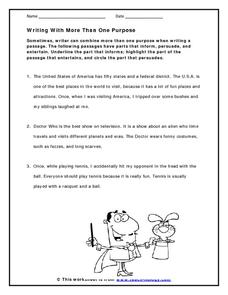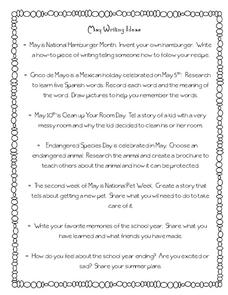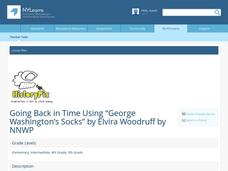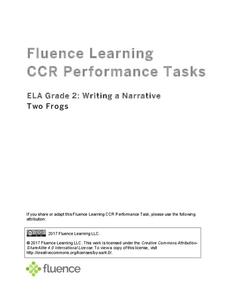Poetry4kids
How to Write a “Favorite Things” List Poem
If your students made a list of their favorite things, would writing poetry be on it? After this poetry writing lesson, it might! Young writers make a list of what they like—or what they don't like—before crafting the list into a rhyming...
Open Oregon Educational Resources
Technical Writing
Hate having to look in multiple sources to find information?Technical Writing contains all information in one book! The book covers everything from defining technical writing, giving examples of technical writing, and tips for creating...
Syracuse University
Ancient World Writing System
Most twenty-first century pupils don't know how to interpret cuneiform. Examining images of cuneiform and papyrus writing and using a chart and Venn diagram, young historians extrapolate what life may have been like for people who lived...
EngageNY
Mid-Unit Assessment: Completing My Draft Position Paper
What's the difference? Scholars analyze the similarities and differences between introductory and concluding paragraphs. Then, using a model essay as a guide, they write their draft position papers.
EngageNY
Revising Draft Letters to a Publisher about an Athlete’s Legacy: Using Critique and Feedback, Part II
Let's get opinionated. Scholars participate in a peer critique and revision process using a fun activity called a Four Corners strategy. After incorporating classmates' feedback, individuals share their final drafts of their opinion...
EngageNY
Revising Draft Letters to a Publisher about an Athlete’s Legacy: Critique and Feedback, Part I
Pick a corner, any corner! Pupils use the Four Corners strategy and Peer Critique protocol to assess one another's draft letters to a publisher about an athlete's legacy. Scholars then use peer feedback to revise their letters.
Writer’s Digest Books
The Writing Prompt Boot Camp
Fourteen days of writing prompts (or 16 if you count the two bonus days) are featured in packet designed for high school, college level, or adult writers.
Lakeshorelearning
Read and Write about It
Reading informational text is a skill that transcends subjects and grade levels. Practice reading about different topics in various formats with a language arts lesson that includes opportunities for writing and research as well.
Trinity University
Explain Yourself: An Expository Writing Unit for High School
Introduce expository writing with a unit that asks writers to craft an essay to explain a belief, value, or priority that is important to them. Mini-lessons within the unit focus on crafting thesis statements and conclusions, selecting...
Minnesota State University
Writing Sample Constructed-Response Assignment
Class members practice their writing skills by completing a prompt about maturity. They develop a constructed response about something they once thought was important, but may not be as important now.
Lincoln-Sudbury Regional High School
WWII Position Paper
There are some historical events that may warrant greater reflection and more in-depth analysis, and the decision to intern Japanese-Americans in the United States during World War II, as well as to drop the atomic bomb on Hiroshima and...
Teach-nology
Writing with More Than One Purpose
It's not very hard to find the author's purpose in narrative, informative, or persuasive writing, but what happens when an author's purpose includes all three types of writing? Determine which sentences in three paragraphs are meant to...
K12 Reader
Using Inference in Writing
What could have happened to a plane buried in snow? Have kids practice making inferences with a writing prompt for which they describe a photo without using specific key words.
T. Smith Publishing
Writing a Friendly Letter
Just because kids today are well-versed in texting and emails doesn't mean they shouldn't learn how to write a friendly letter! Reinforce their letter-writing skills with a lesson focused on the elements of a friendly letter, as well as...
Curriculum Corner
May Writing Ideas
From Cinco de Mayo to Endangered Species day to National Hamburger Month, May is full of ideas to write about. Give young writers prompts that have everything to do with the month of May. Topics include writing a story, conducting...
Fluence Learning
Writing Informational Text: Lemonade Stand
Use a performance task to assess third graders' ability to read informational text. After they plan a lemonade stand business, young entrepreneurs implement that plan through informational writing. The task assumes learners can...
Fluence Learning
Writing an Opinion: Student Council
A three-part assessment challenges scholars to write opinion essays covering the topic of the student council. After reading three passages, writers complete a chart, work with peers to complete a mini-research project, answer...
State University of New York
Going Back in Time Using “George Washington’s Socks”
After reading Elvira Woodruff's George Washington's Socks, young readers and writers embark upon writing their own historically based story, with a focus on developing ideas and details throughout the piece. In small groups, class...
William E.B. DuBois Elementary
Persuasive Writing Graphic Organizer
Take your pick of 16 graphic organizers, all designed for persuasive writing. Some provide space to prepare an entire essay or speech, while others provide space for brainstorming and organizing ideas before settling on concrete ideas...
Bainbridge Class
End of the Year Photo Writing Project
Close out the school year with a look back at a specific event. You provide individuals with photos of themselves, and each pupil fills out the graphic organizer here to prepare for writing a paragraph about the memory depicted in the...
DLTK
Writing Limericks
Scholars are lucky to stretch their poetry writing muscles with a worksheet that challenges them to compose two limericks—one about a boy and the other about a dog.
Fluence Learning
Writing a Narrative: How Bear Lost His Tail
After reading the first, second, and third parts of "How Bear Lost His Tail", third grade writers answer questions about the story by completing a series of options, including discussion points. Then, they begin to plan a new narrative...
Fluence Learning
Writing an Opinion: Is Pride Good or Bad?
Does pride really goeth before the fall, or can it be essential to one's development? Second graders read two of Aesop's fables that refer to pride in their morals, and write a short essay about whether pride is good or bad, based on...
Fluence Learning
Writing a Narrative: Two Frogs
Three options offer young writers the opportunity to read a short story, answer questions, and write a response. A handy language arts resource focuses on reading comprehension and analyziing the story's lesson: look before you leap.
Other popular searches
- Descriptive Writing
- Creative Writing
- Persuasive Writing
- Narrative Writing
- Letter Writing
- Essay Writing
- Writing Process
- Writing Autobiography
- Writing Technique
- Expository Writing
- Writing Fables
- Paragraph Writing






